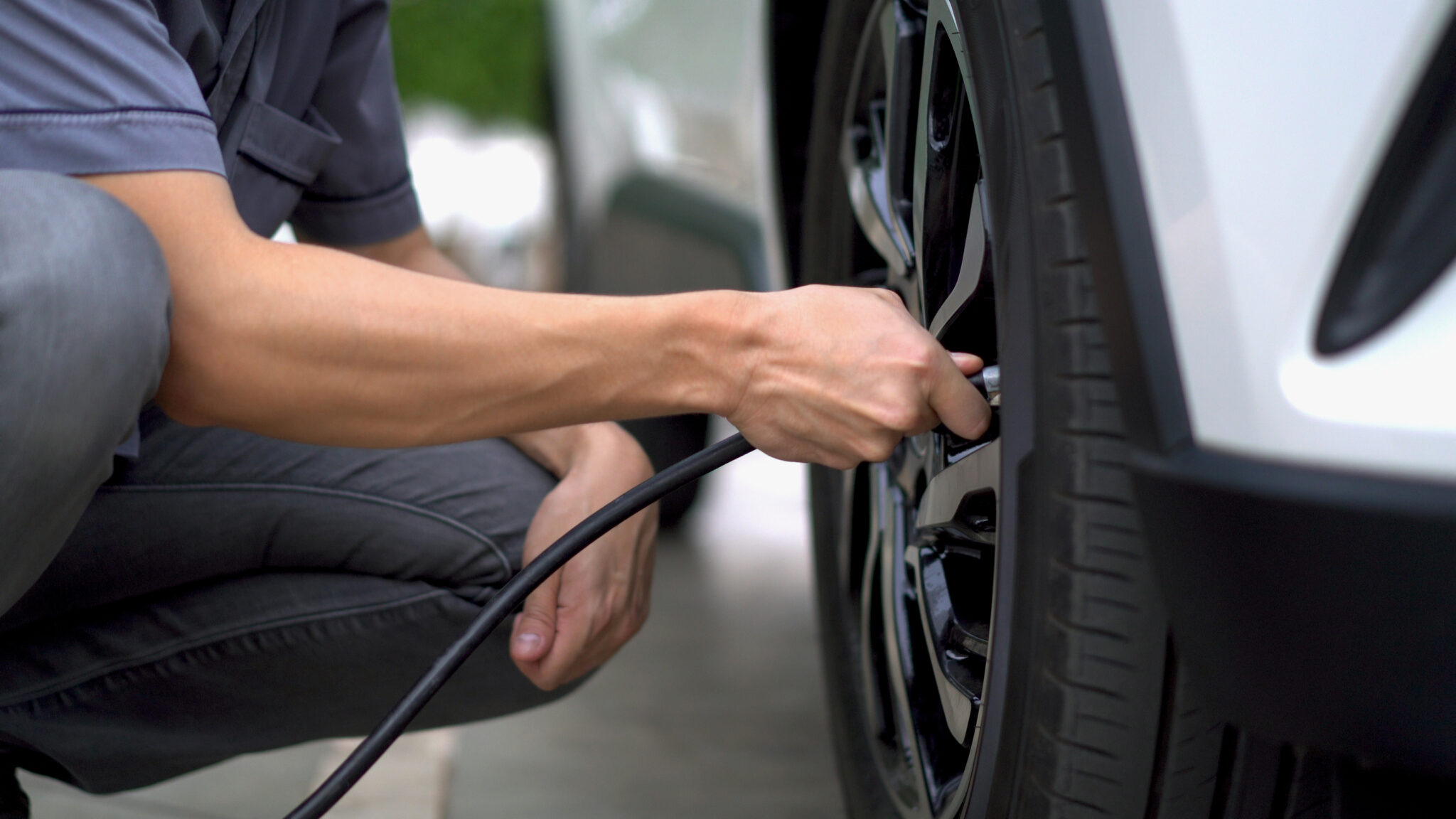Ensuring your vehicle’s tyres are properly inflated is crucial for safe and efficient driving. While it might seem minor, tyre pressure plays a significant role in your vehicle’s performance, including fuel efficiency, handling, and overall safety. Neglecting tyre pressure checks can lead to adverse consequences, ranging from decreased fuel economy to compromised handling and increased risk of accidents. Therefore, making tyre pressure checks a regular part of your maintenance routine is essential for your safety and your vehicle’s longevity. ¹
Maintaining the Correct Tyre Pressure
The manufacturer determines the ideal tyre pressure for your vehicle, typically found in the owner’s manual or on a sticker on the driver’s side door jamb. It’s essential to adhere to these recommendations, as they are tailored to optimise your vehicle’s performance and safety. ¹
Underinflated Tyres
Driving with underinflated tyres can have several adverse effects. When a tyre doesn’t have enough air, it tends to flex more as it rolls, which generates heat. This excessive heat build-up can cause the tyre to wear out prematurely and even blow out, especially at high speeds or under heavy loads. Additionally, under-inflated tyres have a larger contact patch with the road, increasing rolling resistance. This can lead to reduced fuel efficiency and, ultimately, higher fuel costs. ¹
Overinflated tyres
Conversely, overinflated tyres can also pose risks. When a tyre is overinflated, its centre portion bulges outward, reducing the size of the contact patch with the road. This smaller contact area can compromise traction and handling, particularly in wet or slippery conditions. Overinflated tyres wear more quickly and unevenly, reducing their lifespan and necessitating premature replacement. ¹
Effects on Handling and Safety
Properly inflated tyres are essential for maintaining optimal handling and stability while driving. Incorrect tyre pressure can affect the vehicle’s ability to grip the road, especially during cornering or emergency manoeuvres. This can increase the risk of skidding or losing control, particularly in adverse weather conditions. Regularly checking and maintaining the correct tyre pressure can help ensure that your vehicle responds predictably to steering inputs and maintains traction when needed. ¹
Fuel Efficiency
In addition to safety considerations, maintaining the correct tyre pressure can significantly impact fuel efficiency. Underinflated tyres increase rolling resistance, requiring the engine to work harder to propel the vehicle forward. This can decrease fuel economy and ultimately improve fuel costs over time. Properly inflated tyres can help maximise fuel efficiency and reduce your environmental footprint. ¹
How to Check Tyre Pressure
Checking your tyre pressure is effortless and requires minimal equipment. You only need a tyre pressure gauge, which can be purchased inexpensively at most automotive stores. To check your tyre pressure, follow these steps: ¹.
- Locate the recommended tyre pressure for your vehicle (usually found in the owner’s manual or on a sticker inside the driver’s side door jamb). ¹
- Remove the valve cap from the tyre valve stem. ¹
- Press the tyre pressure gauge firmly onto the valve stem to get a reading. ¹
- Compare the measured pressure to the recommended pressure. If the pressure is too low, add air using an air compressor until it reaches the correct level. If it’s too high, release air by pressing the centre pin in the valve stem. ¹
- If applicable, repeat this process for all four tyres, including the spare tyre. ¹
- Replace the valve caps securely after checking the pressure. ¹
It’s an innovative idea to check your tyre pressure at least once a month before long trips or if you notice any signs of underinflation or overinflation. By making tyre pressure checks a regular part of your maintenance routine, you can help ensure a safe, efficient, and comfortable driving experience for you and your passengers. ¹
Correct tyre pressure is essential for safe, efficient, and comfortable driving. Whether you’re commuting to work, running errands, or embarking on a road trip, properly inflated tyres can make a significant difference in your vehicle’s performance and safety. By checking your tyre pressure regularly and ensuring it meets the manufacturer’s recommendations, you can help extend the lifespan of your tyres, improve fuel efficiency, and reduce the risk of accidents on the road. Don’t overlook this crucial aspect of vehicle maintenance-your safety and wallet will thank you. ¹

Disclaimer:
The article aims to provide South African motorists with everything they need about car tyre pressure.
Do you want to buy car insurance now? Get affordable car insurance with one-of-a-kind benefits such as fixed premiums*, reducing excess*, and exceptional service. T’s and C’s apply.
Please get professional financial advice from a certified financial advisor to ensure you select the appropriate financial services product.
This article was prepared by Eric Sandmann in his personal capacity. The views and opinions expressed in this article are the author’s own and do not reflect the views and opinions of Prime Meridian Direct (Pty) Ltd, FSP41040.The views and opinions in the article should not be attributed to anyone but the author unless expressly stated. Nothing in this article should be relied upon as advice, this publication is presented for informational purposes only. No person should act or refrain from acting in reliance on any information found in this article, without first obtaining proper financial advice from the appropriate professional. The author makes no claims, promises or guarantees about the accuracy, or completeness, of any information linked from, referred to, or contained in this article. The author reserves the right, to edit and change the content of this article.
Sources:


























